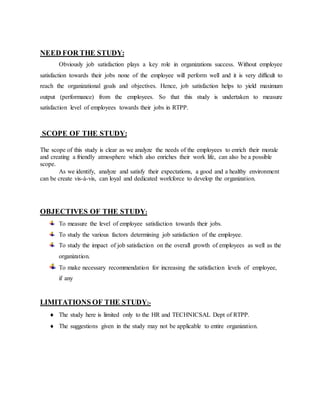Job satisfaction is a critical aspect of the employee experience, as it can have a significant impact on productivity, turnover, and overall organizational performance. Many organizations conduct job satisfaction surveys to assess the level of satisfaction among their employees and identify areas for improvement. However, it is important to recognize that there are limitations to the usefulness and reliability of job satisfaction projects.
One limitation of job satisfaction projects is the subjectivity of the measure. Job satisfaction is a subjective experience that can vary significantly among individuals. Factors such as personal values, beliefs, and goals can influence an individual's level of satisfaction with their job. As a result, it can be difficult to accurately measure and compare job satisfaction across a large group of employees.
Another limitation is the potential for response bias. When employees are asked to participate in a job satisfaction survey, they may not always be honest or may not fully understand the questions being asked. This can lead to inaccurate or misleading results. In addition, employees may feel pressure to provide positive responses in order to appear more favorable to their employer, which can also impact the validity of the results.
Another limitation is the potential for cultural differences. Job satisfaction can be influenced by cultural norms and values, which can vary significantly among different countries and regions. This can make it difficult to compare job satisfaction across different cultures and may lead to inaccurate or misleading conclusions.
A final limitation is the potential for changes in job satisfaction over time. Job satisfaction can change due to a variety of factors, including changes in job duties, relationships with coworkers and supervisors, and overall organizational culture. As a result, job satisfaction surveys may not accurately reflect an employee's current level of satisfaction, as it may have changed since the last survey was conducted.
In conclusion, while job satisfaction projects can be useful in identifying areas for improvement and assessing the overall satisfaction of employees, it is important to recognize the limitations of such projects. Subjectivity, response bias, cultural differences, and changes over time can all impact the reliability and validity of the results. Organizations should consider these limitations when interpreting the results of job satisfaction projects and should be cautious in using them to make significant decisions about employee satisfaction and well-being.







